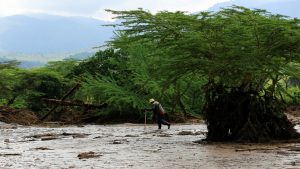A Kenyan insect-rearing farm started two years ago is using larvae to consume 20 to 30 tonnes a day of fruit waste collected from factories and markets in the capital Nairobi, and expects this to triple by the year’s end, its chief executive said.
Insectipro in turn processes the black soldier fly larvae into animal feed and the rest of the waste into manure at its farm, located in Limuru, 28 km from Nairobi.
It produces between 2 and 2.5 tonnes of larvae a day, and expects this to double once it installs a bigger drying machine.
“We hope at the end of the year to be doing between 60 to 100 tonnes (of waste) depending on how fast we can scale… end of the year we are hoping to be doing five tonnes (of egg products) a day,” Talash Huijbers, also Insectipro’s founder, told Reuters while touring Insectipro’s premises.
Nairobi generates about 3,000 tonnes of waste daily, with 60% of it being organic material, according to the Ministry of Environment and Forestry.
In the 10 days the black soldier fly is at larva stage, it is known to consume 60% of the of the waste fed to it.
Huijbers said Insectipro gets its waste from four major markets in Nairobi, fruit juice processing companies and from beer maker East African Breweries Limited.
She said their larvae is sold mostly to animal feed millers, with their biggest client already asking to be supplied with 40 tonnes a month.
“We are hoping to hit that in the coming few months. We have end year orders of 210 tonnes,” Huijbers said.
While use of black soldier fly to produce animal feed has been going on in Kenya as far back as 2012, Huijbers said Insectipro’s scale was the biggest in the country.
Huijbers said to date Insectipro had invested $850,000, with most of it going to machinery, which the company had to design and contract local fabricators to build.
She said Insectipro was researching how to produce chitin, which is left over in the black soldier fly shell when it changes to an adult, and has potential use in the pharmaceutical industry, for example, in wound dressing material.
Huijbers said the company also processes on waste on site at a coffee mill in Thika, and a fruit farm in Machakos and plans to set up in Kisumu and eventually open units in Ethiopia and Rwanda.






